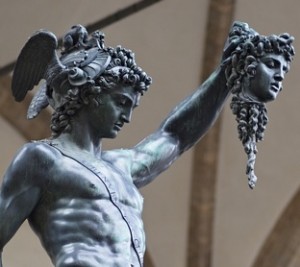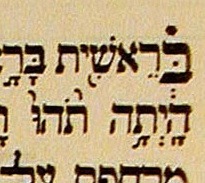 It’s hard not to be captivated by your first close look at a Torah scroll. Jewish scribes pen each one by hand, observing traditions that are thousands of years old for grinding pigments for the ink and preparing the parchment from the skin of a kosher animal.
It’s hard not to be captivated by your first close look at a Torah scroll. Jewish scribes pen each one by hand, observing traditions that are thousands of years old for grinding pigments for the ink and preparing the parchment from the skin of a kosher animal.
Painstakingly hand-inked, the Hebrew letters are as mysterious as they are lovely. From the very first quill mark, these ancient shapes breathe the voice of God.
Beresheet bara Elohim et ha shamayim v’et ha aretz.
In the beginning, God created the heavens and the earth.
Even this very first line of Genesis inspires awe, as we imagine God commanding the universe into existence. But even more remarkable is what this line does not say. Even a four-year-old can tell you what unanswered question lies within.
Where did God come from?
Modern readers often stumble over the Bible’s lack of answers to our theological questions. We expect the Bible to prove God’s existence if its goal is to bring us to faith. But the Bible’s very first words simply assume God’s reality without proving it.
You might be surprised that ancient readers would have found Genesis just as frustrating. Not so much because they didn’t believe in a spiritual world, but because they were consumed by fascination for speculating about the origins and secret lives of the gods they worshiped.
Creation myths functioned as an ancient National Enquirer, satisfying every curiosity. What scandalous truths lurked undiscovered within the spiritual world? What hidden secrets lay behind our mundane reality? Enquiring minds wanted to know.
 Near Eastern mythology was filled with fantastic sagas of the gods’ titillating secrets of their love affairs and bloody battles against each other.
Near Eastern mythology was filled with fantastic sagas of the gods’ titillating secrets of their love affairs and bloody battles against each other.
Did you know Marduk formed the earth by murdering his mother, the monster Tiamat, and arranging the world out of her dismembered corpse? Did you know that when Cronos attacked his father Uranus and castrated him, Aphrodite arose out of the foaming sea when his genitals fell into the water?
Who needs to hear about the latest Elvis sighting or UFO landing when you had gory tales like this around the evening fire?
The account of creation in Genesis stands in stark contrast to the graphic, bloodstained melodramas of the surrounding peoples. It was a radical departure from everything the ancient world had known. In his classic work, Understanding Genesis: The World of the Bible in the Light of History, Nahum Sarna writes:
The Hebrew account is matchless in its solemn and majestic simplicity. It has no notion of the birth of God and no biography of God. It does not even begin with a statement about the existence of God … To the Bible, God’s existence is as self-evident as life itself.
The biblical account is unique among the creation stories of its time. Spare in detail, Genesis speaks with understated elegance and lofty grandeur. It was a stunning contrast to the supermarket tabloid creation stories that circulated among Israel’s neighbors. No attempt is made to explain how God came into existence. Out of an unapologetic majesty, the God of Israel felt no need to answer this obvious question.
Once you see Israel’s God in light of the elaborate myths of the surrounding world, you get a sense that the Bible describes reality rather than fantasy. The Israelites were awestruck by their experience on Mount Sinai, their memories seared forever by a real-life encounter with an unearthly, incomprehensible being. The true God that they experienced was utterly beyond the wildest dreams of the myth-spinning pagan world, and unlike anything anyone had conceived of before. This mysterious entity refused to be represented by any physical form, separating himself completely from every deity they ever imagined. The Israelites simply had no need to concoct fanciful tales about God’s origins in order to convince people of his reality.
What the Bible Does Not Say
 Even in the first verse of Genesis, we see that God doesn’t answer every question. Jewish thinkers believe that the Bible reveals this even in its very first letter. In a Torah scroll, the first letter of the first Hebrew word, beresheet (bare-eh-SHEET, “in the beginning”), stands out in bold, inked larger and darker than the rest of the text. This is the Hebrew letter bet. The letter bet corresponds to our letter B. It is the second letter of the Hebrew alphabet, just as “B” is the second letter of the English alphabet.
Even in the first verse of Genesis, we see that God doesn’t answer every question. Jewish thinkers believe that the Bible reveals this even in its very first letter. In a Torah scroll, the first letter of the first Hebrew word, beresheet (bare-eh-SHEET, “in the beginning”), stands out in bold, inked larger and darker than the rest of the text. This is the Hebrew letter bet. The letter bet corresponds to our letter B. It is the second letter of the Hebrew alphabet, just as “B” is the second letter of the English alphabet.
The rabbis asked the question, “Why do the Scriptures begin with the second letter of the alphabet rather than the first?” Their answer: “To show that the Scriptures do not answer every question, and not all knowledge is accessible to man, but some is reserved for God himself.”
Even the shape of the letter bet shows this. It is closed on the right side, but it is open on the left. Since Hebrew is read right to left, it appeared to the rabbis that the Scriptures start with a letter that is open in the direction of the reading, but closed toward the direction of the beginning of the text. The bet is a one-way sign saying that you need to start here, at the first letter, and move forward, asking what God’s will is and how should you live it out. Because the letter bet is closed on the top, back, and bottom, it is futile to speculate about what is behind (what existed before creation), or above (in heaven) or below (in hell).
One rabbi I met put it this way: “Speculating about what God has not revealed is like pressing on your eyelids with your fingers. The light that you think you see comes only from your own imagination.”
The point of the rabbinic saying about bet is not to discourage study and inquiry, but to teach that the Bible should not be used as a vehicle for endless esoteric exploration. You can study God’s Word all your life and never reach the end of its wisdom, but you cannot force the Bible to answer your every question, twisting and wringing the text until it satisfies your every curiosity. God simply does not choose to reveal some things.
 Excerpt from Walking in the Dust of Rabbi Jesus (Grand Rapids: Zondervan, 2012), p. 154-7.
Excerpt from Walking in the Dust of Rabbi Jesus (Grand Rapids: Zondervan, 2012), p. 154-7.
(Photos: swimfast, gwenflickr)
Kingsly says
This is amazing. Thanks for sharing. Eagerly expecting Walking in the Dust of Rabbi Jesus 🙂
Jordyn Rietveld says
Hello (shalom.) I really enjoyed reading your thoughts about the topic about The Secrets God Keeps. I didn’t know that God could keep secrets although he’s friends with everyone so it makes sense. It’s interesting to note to that in Hebrew you always start with the letter B like Bet or Better. “A four-year-old could tell you the answer to your question.” I thought that was unique and different. Most people don’t know that and that they would be dumbfounded that a four-year-old could answer their question.
Jack says
I feel like people with a Western perspective would look at the concrete example of the opening letter and shake their heads (because we like it when the text just says something straight out—which is why we like Paul and James so much). But it makes sense—why shouldn’t God, writing to a people with an Eastern mindset provide such a straightforward and elegant way of saying, “Here’s where to draw the line, for I am God—and you are so not God.” I also feel like, coming from a Western perspective, this is an incredibly hard lesson to accept—it goes against our concept of scientific reasoning and the idea that eventually, with the right technology and the right advances in scientific theories, we will be able to find out all the secrets of the universe. But we won’t—because the universe was created by a being who is infinitely more powerful and intelligent and creative than we could ever imagine.
And I think that that’s a good thing, whether we realize it or not; because if I’m as intelligent as my Creator is, I have a lot to be worried about (because I’m not all that intelligent). The mystery adds some of the awe factor that we like to take out with all our technology and science (neither of which is bad, unless of course we treat it as the ultimate Truth).
Because God is God, and we are so not God.
Erin says
Thanks for an interesting article, especially the part about the first letter of the Torah scroll. It’s interesting to me as a Western person (to echo what Jack said above) that someone would even ask that question about why it doesn’t begin with the first letter. But by asking that question, they found a beautiful image in their answer. Little things like this make me realize just how much I don’t know — both the things I can’t know and the things I can but have yet to discover. I think there are probably a lot of both.
Nate says
It is intriguing, this example of that first letter. I was also shocked that ancient people would find it as frustrating as believers today do, as we look for answers and defenses against the arguments that say our God doesn’t exist. It’s rough, all this not knowing, but I suppose it’s what we will have to live with. It also makes me sad, that when the Bible is written in Hebrew they have this wonderful symbol of a letter closed on one side and open on the other, and we miss that by reading text translated into our own language.
Dan Whorton says
That this is too deep for humans to understand is clear when we think of the alternative. Suppose God did have a beginning, then who was that and where did that entity come from? Like infinite space — how can you keep going forever and never reach an end? But if there were an end, like a brick wall, what is behind that? We would either go insane trying to understand it, or just rest in peace knowing some things are beyond our comprehension. We are finite; we cannot understand infinity. We need faith to keep our sanity.
Afolabi says
Amazing and timely article. Here we are faced with a disruptive question regarding where does God live? If God is timeless in origin, how can He live in the heaven He created in time Genesis 1:1? Where did He live before the creation of Heaven? To know the orientation of the Hebrew alphabets as the article states, and understand from them that some things are kept in His bossom and not subject to our analysis is comforting. Thanks.
Barbara Hyland says
The Hebrew letters are fascinating! No wonder religious Jews study them for years , trying to unravel the mysteries hidden in them. Thanks for reminding us that God is inscrutable. Our Greek mindset wants to get answers.
Graham Constable says
Very interesting to see this article is extracted from Lois’ ‘Walking in the Dust of Rabbi Jesus’. I read this book a while back and so I need to read it again to appreciate this article in more detail. Fascinating excerpt Lois – thank you! An amazing God we have indeed!
David Hereford says
Thank you so much for given us ways to exalt our LORD here as we experience His life giving Spirit!
John M Akin says
Thank you so much. Always enlightening.
John
Cheryl Strodder says
Absolutely fascinating and intriguing
Deuteronomy 29:29; Romans 11:33
29 “The secret things belong to the LORD our God, but the things that are revealed belong to us and to our children forever, that we may do all the words of this law.
33 Oh, the depth of the riches and swisdom and knowledge of God! tHow unsearchable are his judgments and how inscrutable his ways!
Bill Russo says
Rabbis and scholars spend their lives trying to fill in the blanks in the Biblical stories about origins and many other subjects not fully revealed to their satisfaction.
“Such knowledge is too wonderful for me; It is too high, I cannot comprehend it.” (Psalm 139:6)
I have shalom with not knowing all the beginnings and endings, not only because, as other commenters have noted, some things are not for us to know, but also in my conviction that God HAS revealed all we NEED TO KNOW in the Scriptures, and to us individually by His Holy Spirit. Jesus put it this way: “I AM the way, the truth, and the life.” (John 14:6) Note also His words in Matthew 6:33: “Continually seek His kingdom and His righteousness, and all these things shall be added to you.” (NASB). Also see David’s advice to Solomon in 1 Chronicles 28:9 as well as Solomon’s benediction to his people Israel in 1 Kings 8:57-61.
I am as curious as anyone as to the things not revealed. Therefore, as soon as I have absorbed and mastered all that HAS been revealed to me, I shall delve into those “secrets.”